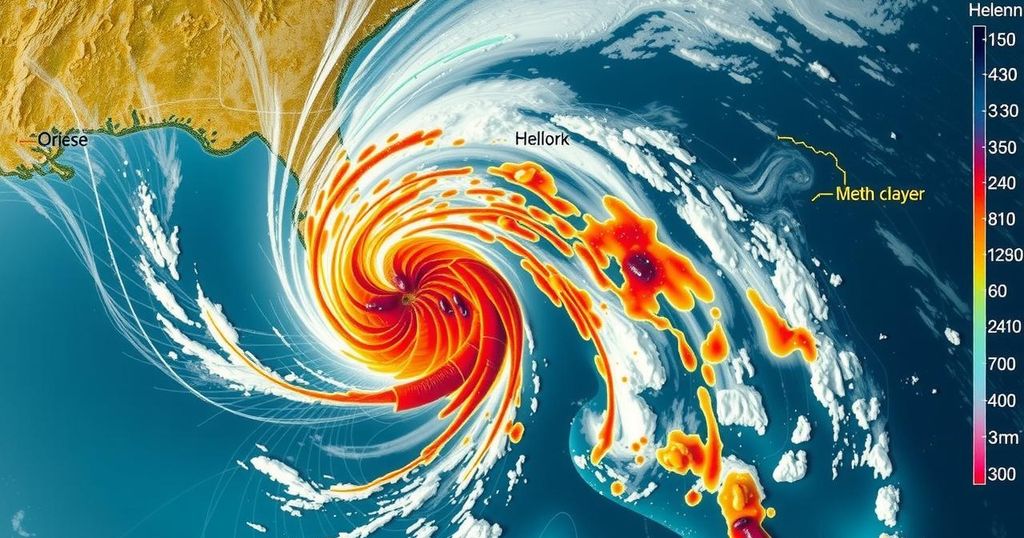Farmers Face Ongoing Challenges Following Hurricane Helene’s Destruction
Farmers in Georgia are still grappling with the impacts of Hurricane Helene, which devastated crops and agricultural infrastructure over two months ago. Estimated losses exceed $10 billion across the South, with significant financial burdens on cotton growers and poultry farmers. Efforts for recovery are underway, but emotional and economic challenges persist as farmers weigh their futures in the industry.
In the aftermath of Hurricane Helene, farmers in Georgia are enduring significant challenges as they recover from the storm’s destruction. More than two months post-hurricane, the landscape of Chris Hopkins’ farm still reveals the extensive damage, with destroyed crops and overturned equipment scattered across his fields. Hopkins, who also cultivates corn and peanuts, expressed the emotional toll of the disaster, grappling with the question of whether to rebuild or step away from farming altogether.
The severe impact of Hurricane Helene, which hit land as a Category 4 storm on September 26, extends beyond Georgia. Experts project the overall financial losses for agribusinesses from Florida to Virginia may exceed $10 billion, encompassing destroyed crops, uprooted timber, and damaged equipment. Notably, cotton growers in Georgia incurred losses of at least $5.5 billion, while North Carolina faced $3.1 billion in damages. The disaster struck at a crucial harvest time, leaving many farmers scrambling to salvage what little remained of their crops.
For Hopkins, the storm resulted in the loss of half of the cotton he had on his 1,400 acres. “We were at the most vulnerable stage we could be. The lint was open and fluffy and hanging there, waiting to be defoliated or picked. About 50% of the harvestable lint ended up on the ground,” he lamented. Despite having insurance, he estimates his losses at approximately $430,000 from cotton alone, without accounting for additional damages such as machinery repairs and lost pecan production.
The storm’s effects reverberated through the agricultural community, as poultry farms also suffered considerable destruction. Jeffrey Pridgen, a fifth-generation farmer, reported losing four chicken houses that each housed up to 20,000 chickens. He remarked on the profound impact: “I was looking at retirement, but I lost my retirement and my income in one day. It’ll be two years before we get fully operational again. I am basically starting over.”
In response to the devastation, Georgia’s government allocated $100 million for emergency loans to assist farmers in their recovery, although constitutional restrictions prevent the direct provision of disaster aid to individuals and businesses. Meanwhile, the poultry industry faces substantial hurdles in rebuilding, as Mike Giles, president of the Georgia Poultry Federation, indicated that the region will remain in a “rebuilding mode” for an extended period.
Despite the losses, experts suggest that consumer prices will likely not experience significant increases, as alternative sources can supply much of the demand. However, pecans might be an exception due to Georgia’s pivotal role in national production. As cotton growers contend with already low prices amidst a difficult harvest season, the combination of pre-existing challenges and hurricane devastation is formidable.
The aftermath of Hurricane Helene highlights the severe impacts natural disasters can have on agriculture, particularly in southern states where farming is a linchpin of the economy. The storm, which made landfall in late September as a powerful Category 4 hurricane, left a trail of destruction that affected crops, livestock, and infrastructure critical to farmers’ operations. The financial repercussions are staggering, with estimates predicting that losses could exceed $10 billion across various agricultural sectors. The emotional and economic distress faced by farmers like Chris Hopkins and Jeffrey Pridgen illustrates the ongoing struggle for recovery amidst the heavy toll of such disasters.
In conclusion, Hurricane Helene’s devastation continues to impact farmers across the South, particularly in Georgia, where losses have been significant. With financial strains exacerbated by existing market challenges, farmers are left to navigate recovery amidst emotional and economic uncertainties. The government’s response, while supportive, underscores the limitations in providing immediate disaster relief. As the agricultural community works toward rebuilding, the future of many farms hangs precariously in the balance, reflecting a broader narrative of resilience in the face of adversity.
Original Source: abcnews.go.com




Post Comment